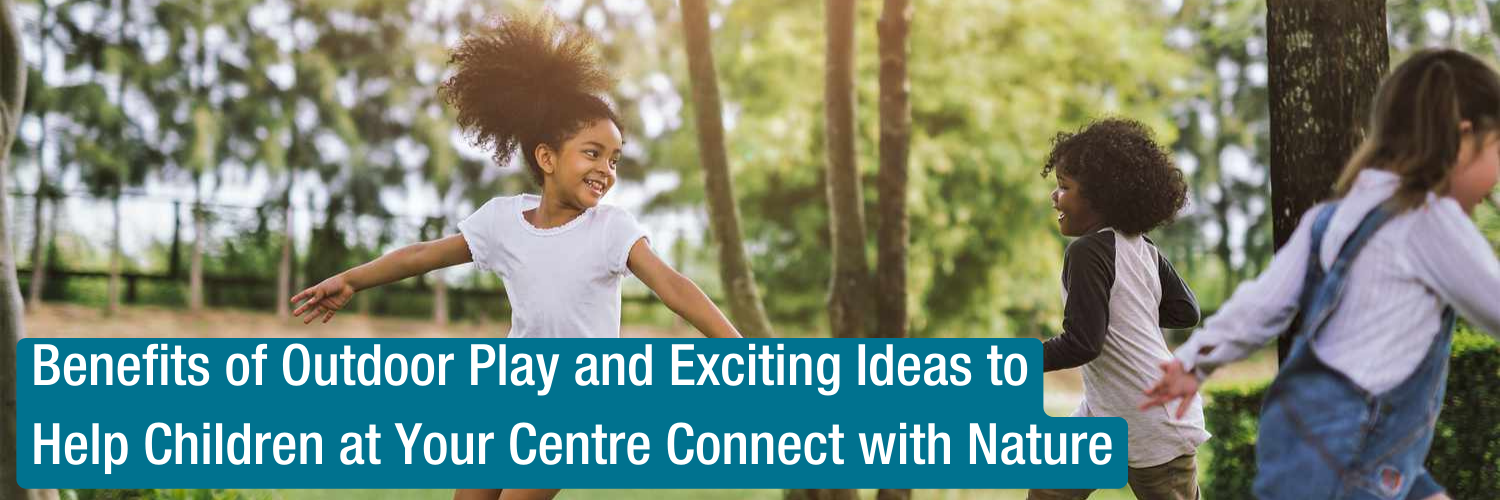Did you know that school-aged children need about three hours of outdoor play each day? While this is a lot to add to a daily schedule, the activity will contribute to the physical and emotional health of a child. It allows children to have a break from devices. Children who engage in active outdoor play in natural environments demonstrate resilience, self-regulation and develop skills for dealing with stress later in life (Professor Susan Herrington, MLA, University of British Columbia; Dr. William Pickett, Queen’s University)
Nature is the ultimate playground for our young learners. Outdoor play is beneficial for children beyond the physical activity it provides. It helps them socialize, understand their bodies better, engage in imaginative play, and enjoy the outdoors. Research has shown that spending time outdoors has numerous benefits for children’s physical, emotional, and cognitive development. Here are some of the incredible advantages of outdoor play:
- Physical Development: Outdoor activities, such as running, climbing, and jumping, play a pivotal role in developing gross motor skills and enhancing overall physical fitness. Through active play, our little adventurers build strength, coordination, and confidence.
- Creativity and Imagination: The natural environment becomes a canvas for your child’s imagination, encouraging them to create their own stories and embark on captivating adventures. Nature’s beauty fuels creativity, allowing them to explore endless possibilities.
- Cognitive Growth: Exploring the wonders of nature introduces children to scientific concepts and instills in them a deep curiosity about the world around them. It sparks questions, ignites the desire to learn, and fosters a lifelong love of learning.
- Emotional Well-being: We understand the importance of emotional well-being in our children’s lives. Spending time in nature has a calming effect, nurturing a sense of peace and reducing stress and anxiety. Nature provides a sanctuary for their emotional growth and stability.
- Social Skills: Engaging in outdoor play often involves teamwork and cooperation. As children explore nature together, they learn valuable social skills, including communication, empathy, and problem-solving.
Exploring Nature: Fun Activities to Try
- Nature Scavenger Hunt: Let the children’s curiosity run wild as they embark on a scavenger hunt. Create a list of items commonly found in the natural surroundings and let them explore to find them. This activity enhances observation skills and keeps our little ones engaged in the wonders of nature. Click to download a sample nature scavenger hunt document.
- Nature Art: Celebrate the fusion of art and nature. Take art supplies outdoors and encourage children to create masterpieces inspired by the beauty around them. Using leaves, flowers, and twigs as brushes or incorporating them into the artwork sparks creativity and appreciation for the natural world.
- Cloud Watching: Immerse children in the enchanting artistry of the sky. On a sunny day, lie down on the grass and gaze at the clouds. Encourage children to identify shapes in the clouds, and together, let your imaginations soar. Click
for a list of books involving clouds, which can be read before and after your Cloud Watching excursion. - Gardening: The act of gardening imparts valuable life lessons to our young learners. Children learn about responsibility, patience, and the magic of watching plants grow.
Like you, we cherish the invaluable learning experiences that nature provides. I encourage our Sentient educators to actively incorporate outdoor play, ensuring that children have the opportunity to explore, discover, and grow in the great outdoors. By fostering a deep connection with nature, we believe our children will develop a profound appreciation for the world they inhabit.
Let us collectively encourage our children to embrace the beauty of nature and create cherished, fun educational moments that will last a lifetime. Together, we shall nurture their inquisitive minds and empower them to become advocates for our planet.


